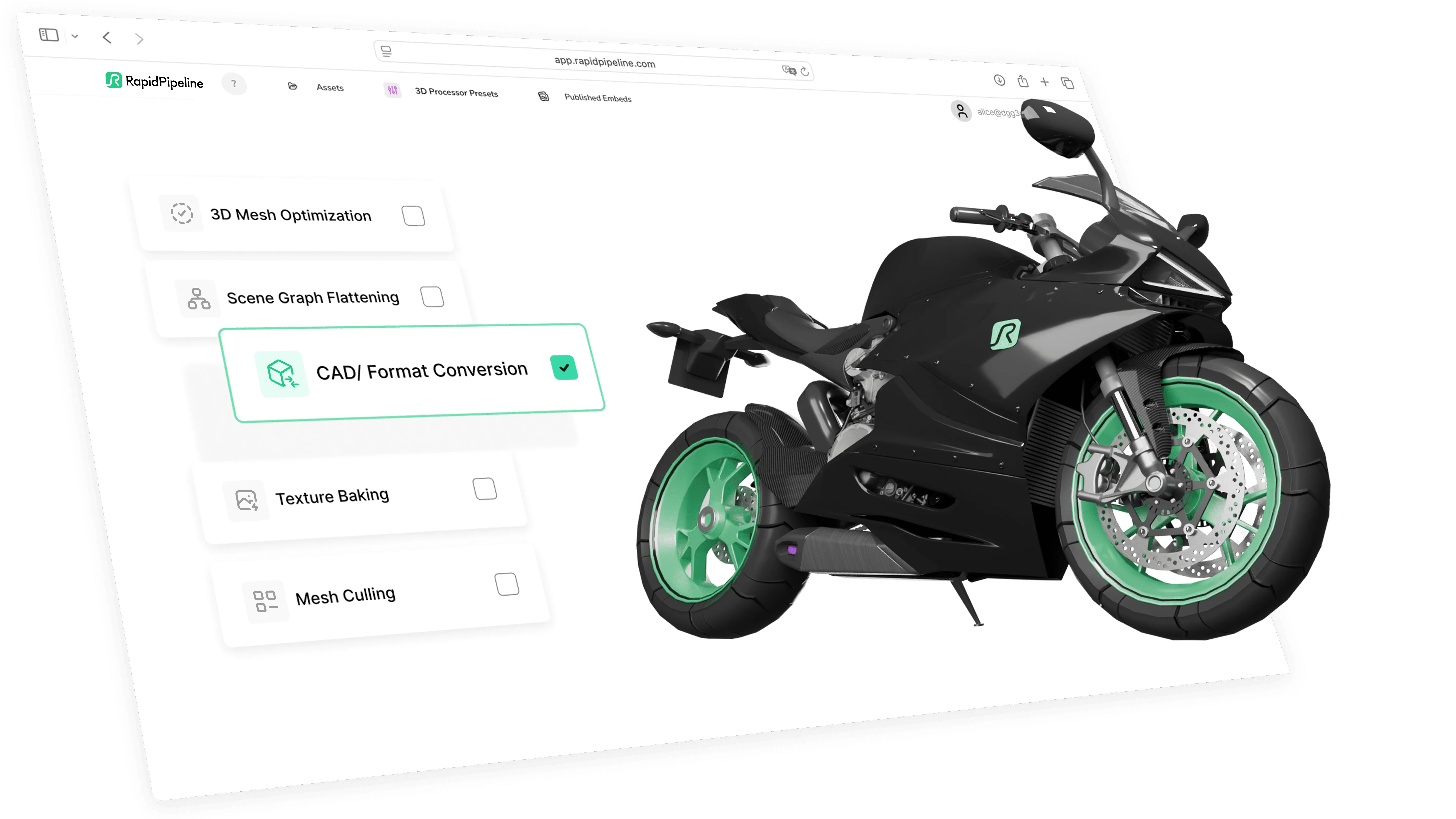STL - Format Overview
Table of Contents
General Information
This guide is part of the RapidPipeline 3D Formats Knowledge Database.
| Format Name | STL |
|---|---|
| Long Name | Stereolithography |
| Extensions | .stl |
| Internet Media Type (previously MIME) | model/stl, model/x.stl-ascii, model/x.stl-binary |
| Common Use Cases | Animation, VFX, Games, Architecture |

Features supported by the STL format
| Feature | Supported? |
|---|---|
| Morph Targets | No |
| Rigid Animations | No |
| Skinned Animations | No |
| Animations | No |
| Free-Form Surfaces | No |
| Geometry Compression | No |
| Quad Meshes | No |
| Basic 3D Geometry | Yes |
| PBR Materials | No |
| Transparent Materials | No |
| Vertex Colors | No |
| Materials | No |
| Scene Composition | No |
| Hierarchical Scene Graph | No |
| Scene Nodes | No |
| Standardized Format | Yes |
| Embedded Textures | No |
| Multiple UV Channels | No |
| Normal Mapping | No |
| Procedural Textures | No |
| Texture Compression | No |
| Texture Transforms | No |
| Texturing | No |
Converting and Optimizing STL Files
There are various ways to convert between STL files and other 3D formats. With RapidPipeline, you can easily convert and and optimize STL files, at scale. It supports STL, as well as many other file formats (examples: 3dsMax, 3MF, ACIS, AutoCAD, CATIA, COLLADA, Creo, DGN, FBX, glTF, I-deas, IFC, IGES, Inventor, JT, Navisworks, OBJ, Parasolid, PLY, PRC/U3D, Revit, Rhino 3DM, Solid Edge, SolidWorks, STEP, STEP Enhanced, USD, USDZ, VDA-FS, VRM, VRML), at high quality.
Due to the potential limitations aforementioned on the table above, in principle, this format cannot always perfectly convert 3D data between STL and other formats. In the following, you can find format conversion guides between STL and the most important other formats, along with a rough score for compatibility of this workflow:
Converting STL to Other 3D File Formats
Converting Other 3D File Formats to STL
- 3dsMax to STL
- 3MF to STL
- ACIS to STL
- AutoCAD to STL
- CATIA to STL
- COLLADA to STL
- Creo to STL
- DGN to STL
- FBX to STL
- glTF to STL
- I-deas to STL
- IFC to STL
- IGES to STL
- Inventor to STL
- JT to STL
- Navisworks to STL
- OBJ to STL
- Parasolid to STL
- PLY to STL
- PRC/U3D to STL
- Revit to STL
- Rhino 3DM to STL
- Solid Edge to STL
- SolidWorks to STL
- STEP to STL
- STEP Enhanced to STL
- USD to STL
- USDZ to STL
- VDA-FS to STL
- VRM to STL
- VRML to STL
What's the best way to get STL files into my 3D applications?
Doing 3D conversion right, especially at scale, can be tricky, as 3D data is in general a rather complex (yet very powerful!) medium. This also applies to STL files - the conversion guide above gives a rough idea. Once you know what you would like to do, tools like RapidPipeline can help you perform the necessary steps, and to automate the process.
However, especially when introducing pipelines and workflows at scale in an enterprise context, it is usually good to rely on dedicated expertise, making sure you do not introduce any steps into your 3D workflow that are detrimental to the final output's quality, or that take your team too much time (and money).
If you're interested to hire dedicated expertise from the best in the field to help your company reach your goals fast and reliably, please do not hestitate to contact DGG. Being the creators of RapidPipeline, and ambassadors for open 3D standards for more than a decade, we have been building some of the world's most advanced 3D pipelines, having processed many millions of 3D assets.
Therefore, our expertise will help you to reach your goals faster, at scale, and with the least possible friction, since we are focused on maximum interoperability.
To get started with 3D data conversion and optimization today, sign up for a free account!
If you have any questions, feel free to chat with our human team.
Meet the Author

3D Knowledge Team
3D Technical Artists
RapidPipeline lets you convert, optimize and prepare your 3D models, easily. Try it today, or meet our human 3D experts. The Best-in-Class Tools for Your 3D Processing Jobs